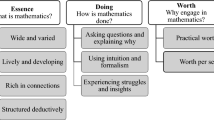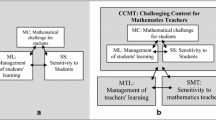Abstract
Acknowledging the contribution of mathematicians to the mathematical education of teachers, we explore mathematicians’ perspective on an envisioned Calculus course for prospective teachers. We analyzed semi-structured interviews with 24 mathematicians using the EDW (Essence-Doing-Worth) framework (Hoffmann & Even, 2018, 2019); and subsequently, we adapted the framework by extending and refining the existing themes. The findings of our study indicate that the mathematicians believe the primary purpose of a Calculus course for teachers is to communicate the nature of mathematics as a discipline. By providing a variety of examples that could shape and expand the teachers’ understanding of mathematics, the majority of the mathematicians participating in the study emphasized the value of mathematical investigation in an envisioned Calculus course for teachers, as well as connections within and beyond the subject.
Résumé
Reconnaissant la contribution des mathématiciens à la formation mathématique des enseignants, nous explorons les points de vue des mathématiciens sur un cours de calcul différentiel qui serait destiné aux futurs enseignants. En utilisant le cadre EDW (Essence-Doing-Worth, soit « essence, faire, valeur ») (Hoffmann & Even, 2018, 2019), nous avons d’abord analysé des entrevues semi-structurées réalisées avec 24 mathématiciens, et, par la suite, nous avons élargi et affiné les thèmes existants de ce cadre. Selon les résultats de notre étude, les mathématiciens estiment que l'objectif principal d'un cours de calcul différentiel destiné aux enseignants est de les aider à mieux comprendre la nature des mathématiques en tant que discipline. En fournissant des exemples variés susceptibles de façonner et d’élargir la compréhension des mathématiques chez les enseignants, la majorité des mathématiciens qui ont participé à l'étude soulignent en particulier l’importance de la recherche mathématique dans un tel cours, ainsi que les liens qui existent à l'intérieur, et au-delà, du sujet.






Similar content being viewed by others
Change history
13 June 2020
In the section titled <Emphasis Type="Italic">On the Worth of Calculus for Calculus Per Se</Emphasis> in the original article.
References
Bass, H. (2005). Mathematics, mathematicians, and mathematics education. Bulletin of the American Mathematical Society, 42(4), 417–430.
Burton, L. (1998). The practices of mathematicians: What do they tell us about coming to know mathematics? Educational Studies in Mathematics, 37(2), 121–143.
Christy, D., & Sparks, R. (2015). Abstract algebra to secondary school algebra: Building bridges. Journal of Mathematics Education at Teachers College, 6(2), 37–42.
Dörfler, W., & McLone, R.R. (1986). Mathematics as a school subject. In B. Christensen, A.G. Howson & M. Otte (Eds.), Perspectives on Mathematics Education (pp. 49–97). Dordrecht: Reidel.
Dreher, A., Lindmeier, A., Heinze, A., & Niemand, C. (2018). What kind of content knowledge do secondary mathematics teachers need? Journal Für Mathematik-Didaktik, 39(2), 319–341.
Even, R. (2011). The relevance of advanced mathematics studies to expertise in secondary school mathematics teaching: Practitioners’ views. ZDM - International Journal on Mathematics Education, 43(6–7), 941–950.
Ferrini-Mundy, J., & Findell, B. (2001). The mathematical education of prospective teachers of secondary school mathematics. Old assumptions, new challenges. In Committee on the Undergraduate Program Mathematics (Ed.), CUPM discussion papers about mathematics and the mathematical sciences in 2010. What should students know? (pp. 31–41). Washington D.C.: Mathematical Association of America.
Goos, M. (2013) Knowledge for teaching secondary school mathematics: What counts? International Journal of Mathematical Education in Science and Technology, 44(7), 972–983.
Goulding, M., Hatch, G., & Rodd, M. (2003). Undergraduate mathematics experience: Its significance in secondary mathematics teacher preparation. Journal of Mathematics Teacher Education, 6(4), 361–393.
Grabiner, J. (1983). Who gave you the epsilon? Cauchy and the origins of rigorous calculus. The American Mathematical Monthly, 90(3), 185–194.
Hodge, A. M., Gerberry, C. V., Moss, E. R., & Staples, M. E. (2010). Purposes and perceptions: What do university mathematics professors see as their role in the education of secondary mathematics teachers? Primus, 20(8), 646–663.
Hoffmann, A., & Even, R. (2018). What do mathematicians wish to teach teachers in secondary school about mathematics? In E. Bergqvist, M. Österholm, C. Granberg, & L. Sumpter (Eds.), Proceedings of the 42nd Conference of the International Group for the Psychology of Mathematics Education (Vol. 3, pp. 99–106). Umeå: PME.
Hoffmann, A., & Even, R. (2019). Contribution of academic mathematics to teacher learning about the essence of mathematics. In the Proceedings of the 43rd Conference of the International Group for the Psychology of Mathematics Education (Vol. 1, pp. XX-YY). Pretoria, South Africa: PME.
Keene, K. A., Hall, W., & Duca, A. (2014). Sequence limits in Calculus: using design research and building on intuition to support instruction. ZDM, 46(4), 561–574.
Klein, F. (2016). Elementary mathematics from a higher standpoint: arithmetic, algebra, Analysis. Vol. 1. Berlin: Springer. Original work published 1908.
Leikin, R., Zazkis, R., & Meller, M. (2018). Research mathematicians as teacher educators: Focusing on mathematics for secondary mathematics teachers. Journal of Mathematics Teacher Education, 21(5), 451–473.
McCrory, R., Floden, R.E., Ferrini-Mundy, J., Reckase, M., & Senk, S. (2012). Knowledge of algebra for teaching: a framework of knowledge and practices. Journal for Research in Mathematics Education, 43(5), 584–615.
Moreno-Armella, L. (2014). An essential tension in mathematics education. ZDM, 46(4), 621–633.
Murray, E., Baldinger, E., Wasserman, N., Broderick, S., & White, D. (2017). Connecting Advanced and Secondary Mathematics. Issues in the Undergraduate Mathematics Preparation of School Teachers, 1, 1–10.
Phillips, G. M. (2005). Mathematics is not a spectator sport. Springer Science & Business Media.
Tall, D. (1991). The psychology of advanced mathematical thinking. In D. Tall (Ed.), Advanced mathematical thinking (pp. 3–21). Dordrecht: Kluwer.
Voigt, M., Apkarian, N., Rasmussen, C., & the Progress through Calculus Team. (2019). Undergraduate course variations in precalculus through Calculus 2. International Journal of Mathematical Education in Science and Technology. https://doi.org/10.1080/0020739X.2019.1636148
Wasserman, N. H. (2018). Connecting Abstract Algebra to Secondary Mathematics, for Secondary Mathematics Teachers. Springer.
Wasserman, N., & Weber, K. (2017). Pedagogical applications from real analysis for secondary mathematics teachers. For the Learning of Mathematics, 37(3), 14–18.
Wasserman, N. H., Fukawa-Connelly, T., Villanueva, M., Mejia-Ramos, J. P., & Weber, K. (2017). Making real analysis relevant to secondary teachers: Building up from and stepping down to practice. Primus, 27(6), 559–578.
Wasserman, N. H., Weber, K., Villanueva, M., & Mejia-Ramos, J. P. (2018). Mathematics teachers’ views about the limited utility of real analysis: A transport model hypothesis. Journal of Mathematical Behavior, 50, 74–89.
Winsløw, C., & Grønbæk, N. (2014). Klein’s double discontinuity revisited: contemporary challenges for university preparing teachers to teach Calculus. Recherches en Didactique des Mathématiques, 34(1), 59–86.
Zazkis, R., & Leikin, R. (2010). Advanced mathematical knowledge in teaching practice: Perceptions of secondary mathematics teachers. Mathematical Thinking and Learning, 12(4), 263–281.
Ziegler, G. M., & Loos, A. (2014). Teaching and learning “What is mathematics”. In Proceedings of the International Congress of Mathematicians (Vol. 4, pp. 1203–1215). Seoul.
Author information
Authors and Affiliations
Corresponding author
Additional information
Publisher’s Note
Springer Nature remains neutral with regard to jurisdictional claims in published maps and institutional affiliations.
Rights and permissions
About this article
Cite this article
Yan, X., Marmur, O. & Zazkis, R. Calculus for Teachers: Perspectives and Considerations of Mathematicians. Can. J. Sci. Math. Techn. Educ. 20, 355–374 (2020). https://doi.org/10.1007/s42330-020-00090-x
Published:
Issue Date:
DOI: https://doi.org/10.1007/s42330-020-00090-x




